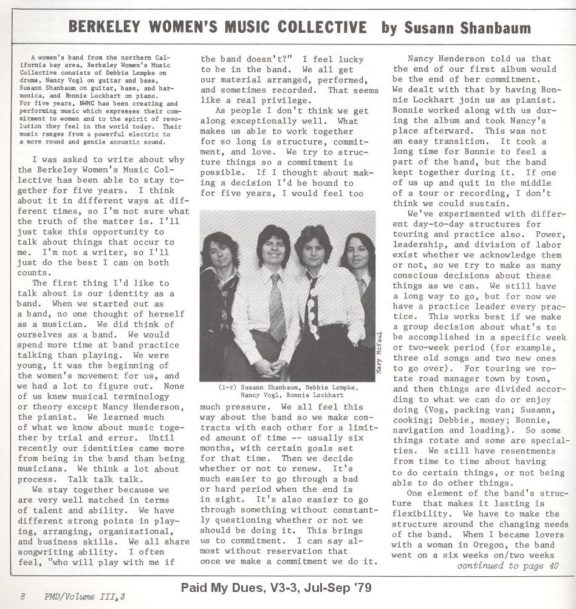In this 1979 article from Paid My Dues, Suzanne describes the band’s process and how they managed to stay together for six years. The band’s longevity has required a lot flexibility from all of the members. It hasn’t always been easy but “it’s either bend or break” Shanbaum says. She explains how they planned their touring schedule, balanced outside lives, and scheduled commitments.
Suzanne discusses the band’s chemistry and the members’ similar levels of musical “talent and ability.” All of the women in the Collective grew up playing music and writing songs, but during their time in the band none of the women considered themselves professional musicians.
Nancy Henderson was the only classically trained musician in the group. Not having a shared musical language ended up being one of the band’s biggest struggles. The Collective struggled to communicate what they wanted to hear and were not able to write their songs down in standard musical notation.
*
In separate recent interviews, Suzanne Shanbaum and Debbie Lempke elaborated on the band’s process:
Suzanne: We got together and started to play together and none of us knew how to read music. We knew how to play basic chords, but we couldn’t transpose. We were just musically illiterate people who liked to play music, with the exception of Nancy Henderson, the piano player. Henderson had had a music education, so poor Henderson had to deal with all of us without a formal language. We had to learn everything by heart– the songs, chords, rhythms, solos, harmonies, background vocal parts, basically everything. I think we practiced four days a week at Debbie Lempke’s house.
The music collective wasn’t just a music collective. We did spend four days a week playing music. We had 10 original songs that we got down perfectly. But while that was going on, we were also focused on the process of creating music together, decision making, artistic tastes, power dynamics, and everything else that comes with creating a collaborative and non-hierarchical project. That was just as important to us as the music we created. We felt that our process would be reflected in the music we created and that is what we believed in.
We had to fight about every single thing. We had to discuss things. We had to understand things. And then we had to go on tour to promote our album. We lived in a van for three weeks or four weeks at a time. We had to figure out how the power dynamics worked within the band. We had to explore boundaries and who we were sleeping with and who you weren’t sleeping with and what these rules could be and how we could take care of everybody and still have the self expression that you need to have when you’re 20 years old, 21, 22, 23, 25 years old and you are trying to understand the world.
How do you have the freedom that you need to understand about the world and to connect with different people and still take care of your relationships? Where are those boundaries? What are the rules by which we can live? We had to figure all that stuff out and we did work to figure it out. We had to just fight through all that stuff and never give up on ourselves or each other.
Debbie: We we had to work slow because we weren’t trained musicians, except Henderson. And so it was always like, “well, remember how we did it last time, did we do it (like this) ?” We had to develop a system of how to make everyone feel as best we could.
We had a system, if it was your tune, you always got the last word. But if anyone wanted to suggest like, “let’s try this or that,” everyone had to get their suggestion played and I think we rotated who ran the rehearsals. Something like that.
But the amount of processing, you would never do this in a band today. They’d be like, “what are you crazy?” We also argued about the material, like is that too much? Can you handle doing that tune? That kinda thing. I mean, I feel like we were practicing practically every day, that’s the kind of thing, it was like our life.
